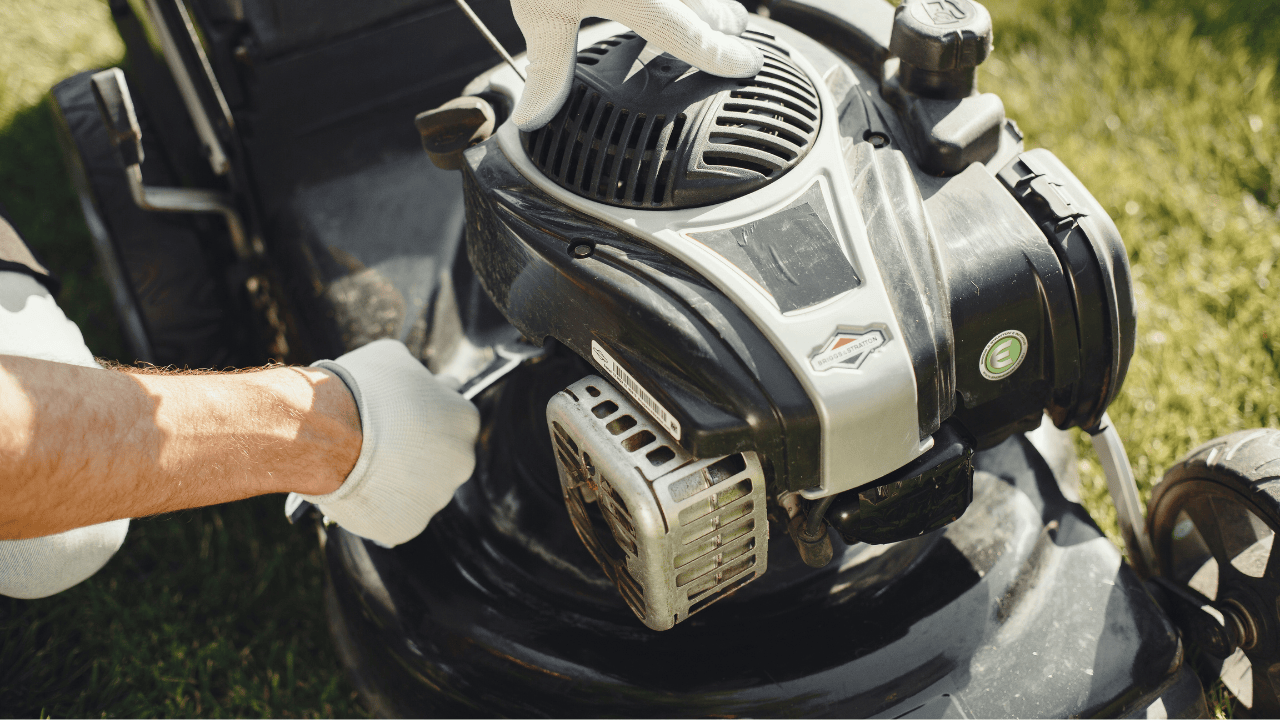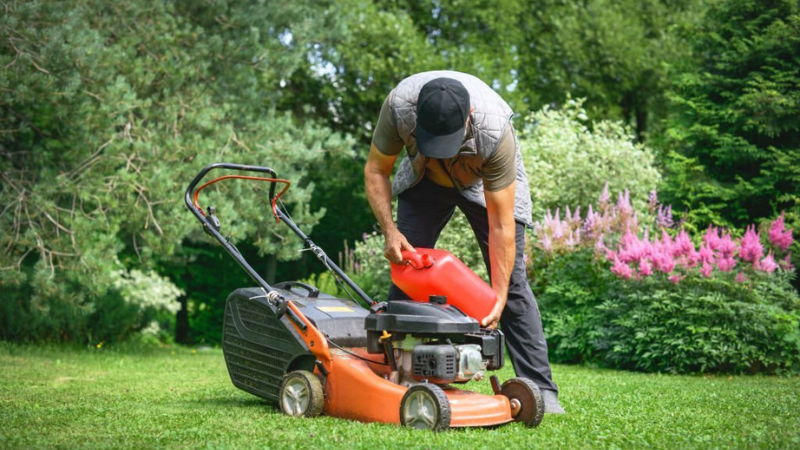A good lawn mower is not cheap and is considered a household investment. So, when you purchase a new mower, whether it’s a battery-powered model or a petrol mower, the goal is for it to last many years down the road.
Proper maintenance and storage of your mower will help it stay in excellent condition year after year and ensure its optimal performance and longevity.
Getting Started
The most effective approach to maintaining your mower is by familiarising yourself with its operation. Valuable insights and guidance can be located within the user's manual. Inside the manual, you'll discover instructions on how to:
- Perform routine maintenance.
- Clean the mower.
- Check fluid levels.
- Address common issues.
- Optimise its performance.
- Safely operate and store the mower.
- Etc.
The manual provides comprehensive information that will empower you to care for your mower effectively.
6 Essential Tips for Maintaining Your Lawnmower's Performance

Here are 11 essential tips for maintaining the longevity and optimal performance of your lawnmower:
Tip #1 - Clean Your Machine After Every Use
Cleaning your lawn mower is the best thing you can do to keep your lawn mower running for years. If any grass or debris is left to build up on or in your mower, it could cause some small components to seize up.
Dust and dirt can get into the motor, inhibiting proper performance. If grass gets stuck in the wheels, it won’t turn correctly, and an axle can become bent or broken. These issues can easily be avoided by cleaning your mower after every use.
Tip #2 - Give Your Mower an Annual Tune-Up
By taking the steps to tune up your mower annually, you can avoid costly repairs down the road. Here's how to do that:
- Air Filter: Clean the air filter and vents, and change the filter if it is dirty
- Oil Filter: Oil filters in mowers are often small but important. They help keep debris that may end up in the oil out of the engine.
- Spark Plugs: Without a good spark, your mower won’t start. It is the heartbeat of the machine. Change the spark plugs every year and avoid getting them wet when cleaning your mower.
- Oil: Change the oil every year. Also, make sure that the oil levels are adequate prior to starting the mower.
- Petrol: Drain the fuel out of your mower at the end of each season to prevent it from going bad and clogging intake lines.
- Sharpen the Blades: A dull mower blade will not cut the grass properly, and it can add to grass build-up on the underside of the mower. Be sure to check the blades frequently during the mowing season to ensure that the blades are still sharp.
- Wheels: Check that your wheels are properly inflated or, if plastic, aren’t damaged. Rocks and tree vines can damage a wheel easily. They can also force your wheels out of alignment. Be sure to check the wheels for damage and ensure they are straight.
Tip #3 - Use a Small Engine Professional
Don’t be stubborn if you can’t get your mower running, and try doing it yourself. Sometimes, it’s more time and cost effective to have a small engine professional work on your mower to return it to peak performance. Over time, lines and tubing tend to get a break and dry rot.
Sometimes, they need to be replaced or, at a minimum, be flushed out. When this happens, unless you are a mechanic, hire a professional. Most lawn mower repair men can get your mower up and running again for under $100.
They typically know the issues with mowers and can troubleshoot them in minutes rather than hours if you need to go through the owner’s manual step-by-step. Keeping your mower in working order for many years is a worthwhile investment.
Tip #4 - Keep Your Machine Tight
Nuts and bolts tend to loosen from the vibrations that mowers create. Ensure all the hardware on your mower is tight and intact before starting it up. Should something fall off during use because you failed to check that everything was tight, the odds of finding it again in the grass are unlikely.
Tip #5 - Store Your Lawn Mower Properly
Storing your mower outside is not a good idea to maintain its good “health.” Keep your mower in a shed or garage. This will protect it from the elements to avoid rust and debris that can harm it.
Also, ensure the mice and other vermin don’t enter your lawnmower's housing. Mice like to make nests in small, dark places. Thus, ensure that your lawn mower is not their first choice. You will reduce the chances of a mouse making a home out of it by ensuring it's always clean.
Tip #6 - Remove Rust
If you use your mower in wet grass and don’t clean it properly, areas that get dinged and dented from rocks can quickly begin to rust. Should rust start to appear on the mower, use a wire brush to remove as much as possible and paint the metal with a rust-proof primer and paint. You can use Bondo and other repair products if you like a project. However, with proper cleaning, many of these issues can be avoided.
Keeping your lawn mower running for years should not be a problem with proper care and maintenance. Much like your car, some annual care can go a long way toward helping your lawnmower last a long time. Your lawn mower is an expensive investment, after all, and without it, your lawn is going to look terrible.
Preparing Your Lawnmower for Winter
Preparing your lawn mower for winter is essential to ensure it starts and runs smoothly in spring. Winterising your mower involves several steps to protect its engine, fuel system, and other components from harsh winter conditions. Here's a step-by-step guide to help you prepare your mower for winter:
Step #1: Cleaning and Maintenance
To properly prepare your mower for winter, it's essential to start with a thorough cleaning. Begin by removing debris and grass clippings from the mower's deck, undercarriage, and engine area. This step is crucial as it prevents the buildup of contaminants that can lead to corrosion and rust.
Next, consider changing the oil according to the manufacturer's instructions. Old oil can accumulate impurities over time, making this a necessary maintenance task. Additionally, inspect the air filter and either replace it with a new one or clean it if it's reusable. Lastly, don't forget to lubricate moving parts such as the wheels, cables, and throttle linkage to prevent rust and ensure they function smoothly.
Step #2: Fuel and Battery
To safeguard your mower's fuel system during the winter months, it's essential to take a few key steps. First, add a fuel stabiliser to the gas tank. This stabiliser will help prevent fuel degradation, ensuring the fuel remains suitable for use when spring arrives. Then, run the engine briefly to allow the stabilised fuel to circulate through the carburetor and fuel lines.
If your mower uses a battery, removing it for the winter is crucial. Store the battery in a dry place away from freezing temperatures to maintain its condition. You may also consider using a battery maintainer to keep it charged during the winter.
Step #3: Spark Plug and Blade
The spark plug and mower blade are critical components that warrant attention. Inspect the spark plug for signs of wear, fouling, or corrosion. If any issues are detected, replace the spark plug as necessary. Likewise, we recommend removing the mower blade, cleaning it thoroughly, and sharpening it using a file or a professional blade sharpener. A sharp blade ensures a clean cut when you resume mowing in the spring.
Step #4: Tire Pressure and Storage
Proper tire pressure is important for winter storage. Check and adjust the tire pressure to the recommended level to prevent damage to the tires during storage. When it comes to storing your mower, choose a cool, dry, and well-ventilated location.
If possible, store it indoors, such as in a garage or shed, to protect it from the elements. If outdoor storage is the only option, consider using a mower cover to shield it from rain and snow. Always consult your owner's manual for specific storage instructions the manufacturer provides.
Frequently Asked Questions (FAQs)
Here are some frequently asked questions on maintaining your lawnmower.
What can damage a lawn mower?
Several factors can damage a lawn mower, including stale gasoline, a dirty or loose spark plug, a clogged carburetor, pull cord problems, burning oil, loss of power while mowing, smoke rising from the lawnmower, failure to start, faulty parts, and exposure to rain. Regular maintenance and proper storage can help prevent these issues and prolong the life of your lawn mower.
How often should you oil your lawn mower?
We recommend that you change the oil in your lawn mower every 20-50 hours of operation. For most people, this translates to changing the oil once every season. However, if the engine is going to be used in a heavy grass area, it may need to be changed more frequently.
Likewise, check the oil level in your lawn mower before each use and add oil if necessary. Even if you use your mower lightly or infrequently, we advise that you change your mower’s oil once a season.
How long will a lawn mower last?
The average lifespan of a lawn mower ranges from eight to ten years with proper care and maintenance. Gas mowers typically last between five and ten years, while electric mowers can surpass the ten-year mark. Reel mowers can last indefinitely with regular sharpening. However, a lawnmower that is not maintained may last only half that time. The lifespan of your lawnmower can also depend on how often you use your lawn mower and the conditions in which it is used.

Summary
Maintaining your lawnmower properly is the key to keeping it running smoothly for many years. By following the steps outlined in this blog, from regular cleaning and oil changes to fuel stabilisation and blade sharpening, you can ensure that your lawnmower remains a reliable partner in maintaining your lawn's beauty.
Remember, a well-maintained lawnmower saves you time and money on repairs and ensures that your lawn continues to look its best season after season. So, invest in the care of your lawnmower today and enjoy its faithful service for years to come. Your lawn will thank you for it.








